Club Atlético River Plate
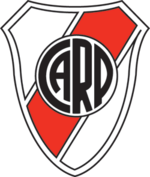 |
||||
| Full name | Club Atlético River Plate | |||
|---|---|---|---|---|
| Nickname(s) | Los Millonarios (The Millionaires), El Millo (The Millio[naire]), La Banda Roja (The Red Stripe), La Máquina (The Machine) |
|||
| Short name | C.A.R.P, River | |||
| Founded | 25 May 1901 | |||
| Ground | El Monumental, Belgrano, Buenos Aires (Capacity: 65,645 [1]) |
|||
| Chairman | ||||
| Manager | ||||
| League | Argentine Primera División | |||
| Clausura 2010 | 13th | |||
| Website | Club home page | |||
| All-time top scorer | Ángel Labruna: 293 goals | |||
|
||||
Club Atlético River Plate, known also as River Plate (Spanish pronunciation: [ˈriβer ˈpleit]) or simply River, is an Argentine sports club best known for its football team, established in 1901. The club is based in the Buenos Aires neighborhood of Núñez, and play at the Estadio Monumental Antonio Vespucio Liberti. River is the 9th football club in the All-Time (1.1.1991 - 31.12.2009) Club World Ranking and the 1st in America, according to the International Federation of Football History and Statistics (IFFHS).[1] The club is currently ranked 330th[2] in the world and in the past it has been ranked as the best football club in the world six times in the monthly IFFHS club world ranking, the last time being in October 1998.[3] River Plate is also the originary club of legendary football players such as golden ball winners Alfredo Di Stefano and Omar Sivori, who later became famous in Real Madrid and Juventus FC respectively, and legendary goalkeeper Amadeo Carrizo, who was awarded by the FIFA as the best goalkeeper of all time of the Americas.
"River Plate" is sometimes used as the English name for the Río de la Plata, the river on which Buenos Aires sits. It is believed that, in the club's early days, one of the founders (Martínez) observed sailors playing impromptu football games in the port of Buenos Aires next to crates marked "The River Plate", hence the club name.[4]
River has always been one of the most important teams of South America. They have combined to win 38 official tournaments which includes 33 Argentine League titles, 2 Copa Libertadores (1986, 1996), a Supercopa (1997) and an Intercontinental title (1986). In 1986 River Plate fans had the distinction of watching River win the league title, Copa Libertadores, Interamerican Cup, Intercontinental Cup, as well as Argentina's triumph in the 1986 FIFA World Cup with Hector Enrique, Nery Pumpido, Oscar Ruggeri.
Contents |
History
Club Atlético River Plate was founded on May 25, 1901, close to the La Boca neighborhood (later the home of fierce rivals Club Atlético Boca Juniors). The club moved first to Palermo and then to Núñez on the northern side of the city in 1923. In the 1920s, River won only an amateur championship in 1920.
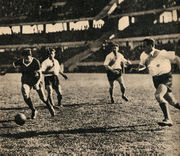
With the onset of professionalism in the early 1930s, River acquired Bernabé Ferreyra, "La Fiera" (the fierce), from Tigre for a then unheard of sum, and paid mostly in gold. The club became known as Los Millonarios ("The Millionaires"). They won the league title in 1932 (beating Independiente in the final), 1936 and 1937.
In the 1940s Alfredo Di Stéfano and 1950s Eduardo Omar Sívori played for River before moving on to become stars in Europe - Sívori for Juventus and Di Stéfano for Real Madrid. Some River players, including Di Stéfano, had stints in the Colombian El dorado "pirate" league, which was not recognised by FIFA, when it was the world's wealthiest.
River's attractive, offensive playing style earned the side of the early 1940s the nickname La Máquina ("The Machine"). The names of the team's five forwards (Muñoz, Moreno, Pedernera, Labruna, Loustau) are well known to most Argentine fans. La Máquina is often considered as the predecessor of Holland's total football which took the 1974 World Cup by storm, reaching the final where they lost to Germany. This team crowned itself champion in 1941, 1942, 1945 "Los Caballeros de la Angustia" and 1947.
In the 1950s, River won five out of six league titles (1952, 1953, 1955, 1956, 1957), before an 18-year drought ensued. Within those years, "The Millonaires" reached the Copa Libertadores' final in 1966. In the final's playoff in Santiago de Chile, River began winning 2-0, but finally was defeated by Peñarol 2-4. Though the club of Núñez didn't win any championship in the 1960s, it finished runner-up several years, including a final loss (1-4) against the Chacarita Juniors in the 1969 National Championship.
River returned to form in 1975 and then had a string of championship titles under coach Angel Labruna with players like Ubaldo Fillol, Daniel Passarella and Norberto Alonso. Under the command of "Angelito", River won the Metropolitano championships in 1975, 1977, 1979, 1980, and the Nacional tournaments in 1975, 1979. The famous Alfredo Di Stefano replaced Labruna in 1981 and won the National tournament of that year, with the presence of "Matador" Mario Kempes in the team's lineups.
In 1983, Enzo Francescoli was transferred from Uruguayan side Montevideo Wanderers to take Alonso's place. He had two stints with River, achieving international renown, and became known as "The Prince". In 1986, just after Francescoli's transfer to Racing Club Paris in France, River won their first Libertadores Cup. A new generation of home-grown players, led by Claudio Caniggia, went on to achieve success both with River and abroad.
River Plate have won 33 Argentine professional championships, as well as the Intercontinental Cup in 1986 and the Copa Libertadores (twice) in 1986 and 1996, both times beating the same club in the final, America de Cali. They also won the Copa Interamericana in 1987, beating LD Alajuelense from Costa Rica and the Supercopa in 1997, beating São Paulo FC. River was the first team in Argentina to simultaneously win an international title (Supercopa) and a First Division Championship (Torneo Apertura 1997). This series of successes led the club to first place in the IFFHS ranking for six consecutive months, the first Argentine club to do so. They are also the only Argentine club ranked as the best World team in a full season (1997-1998).[5]
In 1999, a special edition of the Argentine sports magazine "El Gráfico" named River Plate as "Champions Of The Century" ("Campeón Del Siglo"), noting the clubs achievements, especially their then 28 Argentine championships against Boca Juniors' 19 and Independiente's 13 (all figures as of 1999). And, the following year, in a FIFA sponsored vote River were voted the best Argentine team of the 20th century.[6]
In 2008, Diego Simeone was appointed manager of the club, in his first season he led them to their first league title in four years, winning the Clausura championship. The following season the club suffered a poor run of form resulting in Simeone's resignation mid-season. The club went on to finish in last place in the Apertura 2008, the first time they had ever finished bottom of a league in 107 years.
River in Copa Libertadores
River Plate first participation in Copa Libertadores came in 1966, when the runners-up of the South American leagues were included for the first time. In this cup River reached the final, but lost the final 2-4 against Peñarol of Montevideo.
Since that edition, River Plate has become the Argentine club with the most participations, and the Argentine team that has won the most points.
In 1976 River won the league title coached by Ángel Labruna, which ended 18 years without a title, including players like Ubaldo Fillol, Roberto Perfumo (winner of the cup in 1967, playing for Racing Club), Daniel Passarella, J. J. López (winner of the cup in 1985, playing for Argentinos Juniors), "El Beto" Alonso and Leopoldo Luque, reached the final. This time, their rivals were the Brazilian team Cruzeiro, after losing the first match and winning the second, River lost the tie in the third atch played in Santiago, Chile.
River's next appearance in the final came in 1986. On the way to the final La Banda beat Boca Juniors, Peñarol and Montivedeo Wanderers in the first round, and then Barcelona Sporting Club and Argentinos Juniors (the reigning champions) in the semi-final group. They met América de Calí in the final who featured Argentine players such as Oscar Falcioni, Carlos Ischia, and Alejandro Gareca. In the first leg, disputed at Cali, Colombia, River won 2-1, the scorers were Alonso and "Buffalo" Funes. One week later, before a full Monumental, River ended its long Via Crucis in the history of the Libertadores, defeating América 1-0, the scorer was again Funes.
River could not retain title the following year, being eliminated by eventual champions Peñarol.
The millonarios returned to the Libertadores in 1990, after beating Independiente, lost in the semifinals against Barcelona Sporting Club.
The next year, 1991, River share the group with Boca and the Bolivian teams of Bolívar and Oriente Petrolero. The first match, against Boca in the Bombonera, saw one of the great superclásicos: The bosteros, losing 1-3 at half time, came back to win 4-3. River eventually finished bottom of the group and were eliminated.
In 1993, River faced Argentine rivals Newell's Old Boys in the group stage, along with Olimpia and Cerro Porteño, of Paraguay. After a suspicious match which finished 1-1 between Newell's and Olimpia, River was eliminated again in first round.
1995: River won its first stage group, ahead of Independiente, Peñarol and Cerro (of Montevideo), then defeated Universidad Católica, of Chile, and then Carlos Bianchi's Vélez Sarsfield (reigning champions of South America), but fell in the semifinals against Atlético Nacional of Medellín, where played goalkeeper Carlos Higuita.
1996: After ten years, River won La Copa again. In the first round won its group, who shared with San Lorenzo de Almagro, the other Argentine champions, and the club of Venezuela Minervén and Caracas FC. Later they defeated the Peruvian club Sporting Cristal; then San Lorenzo de Almagro and Universidad de Chile in the semis. Finally, River must play the decisive matches against the same rival of 1986, América de Cali. Though La Banda lost the first leg at Cali (0-1), won the second leg in Monumental 2-0 (both goals scored by "Valdanito" Crespo). The lineups of River that match was: Germás Burgos; Hernán Díaz, Daniel Rivarola, Carlos Altamirano; Marcelo Escudero, Matías Almeyda, Gabriel Cedrés; Ariel Ortega, Hernán Crespo, Enzo Francescoli (captain). The coach was Ramón "El Pelado" (the bald) Díaz.
In 1997 River failed to defend their title after defeat by Racing Club, after two drawn matches, 1-1 and 3-3, by penaties shoutouts.
In 1998 eventual winners Vasco de Gama beat the millonarios in the semifinals.
1999: River lost another semifinal, this time against Palmeiras of Brazil.
2000: Began the most obscure and shamed age of River in the Copa Libertadores. In the quarterfinals, after defeat Boca Juniors 2-1 at Monumental, River was crushed 0-3 in the Boca stadium. The "Xeneises" advanced to semifinals and later won the Cup against Palmeiras.
2004: River Plate were again defeated by Boca Juniors, this time in a penalty shootout. This time, Boca finished losing in the final to the almost unknown Once Caldas from Colombia.
2006: Again under the command of Passarella, River made a great first round, defeated the powerful Corinthians in 2nd round, but after the intermezzo due the World Cup, and the sale of several players - the team of Núñez fell in Asunción against Libertad, from Paraguay, being eliminated.
2008: River reached the quarterfinals, when they were eliminated. After losing 1-2 in the first leg against San Lorenzo de Almagro, River established a 2-0 lead in the second leg at the Monumental, San Lorenzo were then reduced to nine players following two red cards, but came back to score two goals to eliminate River.
Colours
Kit manufacturer and Shirt sponsors
| Period | Kit Manufacturer | Shirt Sponsors |
|---|---|---|
| 1979–1980 | Sportlandia | none |
| 1981–1982 | Olimpia | |
| 1982–1985 | Adidas | |
| 1985–1989 | Fate O | |
| 1989–1991 | Peugeot | |
| 1991–1992 | Carta Credencial | |
| 1992–1995 | Sanyo | |
| 1996–2002 | Quilmes | |
| 2002–2006 | Budweiser | |
| 2006–2008 | Petrobras | |
| 2009–2010 | Petrobras and Pokerstars.net | |
| 2010–2012 | Petrobras |
Rivalry
River Plate and Boca Juniors are the two largest football clubs in Argentina, with more than half the country's football fans supporting the clubs. Due to the rivalry between them, the Boca Juniors vs River Plate Superclásico local derby match was listed by the BBC as one of the most famous derbies in the world.[7], and also as one of the Fifty sporting things you must do before you die by The Observer newspaper. [8].
Club nicknames
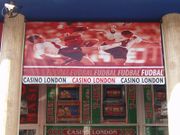
River fans and the press are fond of the nickname Los Millonarios. This name derives from the 1930s after some expensive transfers of players from other clubs, including Carlos Peucelle from Sportivo Buenos Aires in 1931 and Bernabé Ferreyra from Tigre in 1932. Between 1979 and 1981, the River squad was reputed to be amongst the most expensive in the world.
Fans of rival clubs call River Gallinas (literally hens, but more akin to chicken). This nickname was born after the final of the Copa Libertadores in 1966 against Uruguayan team Peñarol. River were ahead 2-0 but ended up losing the game 4-2, during the infamous title drought that lasted from 1957 to 1975, a period that included 11 second places in the Argentine league. [9]
Due to the red band in their shirt, it is also common to refer to River as El Equipo de la Banda Roja (the team with the red band) or simply La Banda (which also means "the band" -both as in "gang" and "musical group").
Some famous River teams earned nicknames, notably La Máquina (the machine), the team that astonished Argentine football between 1941 and 1945.
In 1996 and 1997, during a run of title wins (three Argentine titles, one Copa Libertadores and one Supercopa), River were sometimes called La Maquinita ("The Little Machine") by the press. That team featured Francescoli and younger players such as Juan Pablo Sorín, Hernán Crespo, Ariel Ortega, Marcelo Salas and Marcelo Gallardo.
Stadium
- See main article Estadio Monumental Antonio Vespucio Liberti
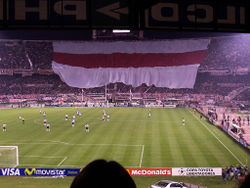
El Monumental is River's home stadium in the Belgrano neighborhood of Buenos Aires. With a capacity of 65,645, the stadium was inaugurated on May 25, 1938. Is also used in matches for the Argentina national football team.
Players
Current squad
Current squad for Club Atlético River Plate as of September 9, 2010 ()
Sources: Argentine Soccer
|
|
Manager: Juan José López
Out on loan
Note: Flags indicate national team as has been defined under FIFA eligibility rules. Players may hold more than one non-FIFA nationality.
|
|
Notable former players
Top Goalscorers
| # | Player | Matches | Goals |
|---|---|---|---|
| 1 | Angel Labruna | 515 | 293 |
| 2 | Oscar Más | 382 | 198 |
| 3 | Bernabé Ferreyra | 185 | 187 |
| 4 | José Manuel Moreno | ||
| 5 | Norberto Alonso | ||
| 6 | Adolfo Pedernera | ||
| 7 | Enzo Francéscoli | ||
| 8 | Carlos Peucelle | ||
| 9 | Carlos Morete | ||
| 10 | Felix Loustau |
see also Category:River Plate footballers
Note: The Players marked '(c)' have also coached the team
Early Days and La Máquina
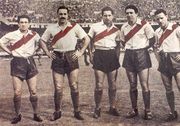
|
|
1950s, 1960s and 1970s
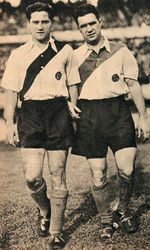
|
|
1980s and early 1990s
|
|
Late 1990s to date
|
|
Notable Managers
See also List of Club Atlético River Plate managers
The following managers have all won at least one championship or, in the case of Reinaldo Merlo, coached many games in a championship that was ultimately won.
| Name | Period | Trophies | Total | ||||||||
|---|---|---|---|---|---|---|---|---|---|---|---|
| Domestic | International | ||||||||||
| CA | MT | NC | AP | CL | CL | SC | CIA | CI | |||
| 1931-1933 |
|
|
|
|
|
|
|
|
|
|
|
| 1934-1938, 1961 |
|
|
|
|
|
|
|
|
|
|
|
| 1939–1944, 1965 |
|
|
|
|
|
|
|
|
|
|
|
| 1945-1959, 1963 |
|
|
|
|
|
|
|
|
|
|
|
| 1968-1970, 1975-1981 |
|
|
|
|
|
|
|
|
|
|
|
| 1981–1982 |
|
|
|
|
|
|
|
|
|
|
|
| 1984–1987 |
|
|
|
|
|
|
|
|
|
|
|
| 1987-1988 |
|
|
|
|
|
|
|
|
|
|
|
| 1989,2005 |
|
|
|
|
|
|
|
|
|
|
|
| 1990-1994, 2006-2007 |
|
|
|
|
|
|
|
|
|
|
|
| 1994, 2000-2001 |
|
|
|
|
|
|
|
|
|
|
|
| 1995–1999, 2001-2002 |
|
|
|
|
|
|
|
|
|
|
|
| 2002–2003 |
|
|
|
|
|
|
|
|
|
|
|
| 2004-2005, 2009-2010 |
|
|
|
|
|
|
|
|
|
|
|
| 2008 |
|
|
|
|
|
|
|
|
|
|
|
Titles
Amateur Championships
-
- Second Division: (1) 1908
-
- First Division: (1) 1920
Cups (Amateur Era)
-
- Copa Competencia Jockey Club: (1) 1914
-
- Cup Tie Competition: (1) 1914
Professional Championships
First Division (33) record
-
- Campeonato Argentino: (12) 1932, 1936, 1937, 1941, 1942, 1945, 1947, 1952, 1953, 1955, 1956, 1957
-
- Metropolitano: (4) 1975, 1977, 1979, 1980
-
- Nacional: (3) 1975, 1979, 1981
-
- Liga Argentina: (2) 1985-86, 1989-90
-
- Torneo Apertura: (6) 1991, 1993, 1994, 1996, 1997, 1999
-
- Torneo Clausura: (6) 1997, 2000, 2002, 2003, 2004, 2008
Copa de Competencia (Competition Cup): (1) 1932
Copa de Oro (Gold Cup): (1) 1936
Copa Dr. Carlos Ibarguren: (4) 1937, 1941, 1942, 1952
Copa Adrián C. Escobar: (1) 1941
International Titles
International Conmebol Titles
-
- Copa Libertadores: (2) 1986, 1996
-
- Supercopa (Champions of America's Cup): (1) 1997
-
- Intercontinental Cup: (1) 1986
-
- Copa Interamericana: (1) 1987
Other International non-Conmebol Titles
Carlsberg Cup (Toronto):2009
Edmonton Cup:2009
- Argentina-Uruguay Tournaments (AFA-AUF)
Río de la Plata Tournament (Dr. Ricardo C. Aldao Cup): 6 (5)
Played between the Champions of Argentina and Uruguay. Discontinued since 1955.
- 1936, 1937, 1941, 1945, 1947, 1955 (Second leg not played. Title was not officially proclaimed.)
Other sports
River Plate also has a basketball team playing in the amateur Buenos Aires league. It played 10 seasons in the Liga Nacional de Básquetbol between 1985-1993 and 2004-06, reaching the finals in 1988 and obtaining 2nd place in 2004 and 2005 editions of Copa Argentina, but in July 2006 the club got expelled by the League because of a debt in player's salaries. River Plate also has professional male and female volleyball teams in regional and national competitions, male and female handball teams among the best in regional and national competitions and a female field hockey team that made its debut in Buenos Aires' top division in 2007.
Notes
- ↑ IFFHS-All-time club world ranking
- ↑ IFFHS-Club world ranking(current)
- ↑ IFFHS-Most times on 1st place(monthly)
- ↑ "Historia - Nacimiento y Desarrollo" (in Spanish). River Plate official site. http://www.cariverplate.com.ar/tpl.php?cat=es&url=historial.php. Retrieved 17 December 2009.
- ↑ L'Humanité July 15 1998 edition (French)
- ↑ FIFA doc
- ↑ BBC Academy, famous football derbies
- ↑ 50 sporting things you must do before you die
- ↑ La Prensa's article (Spanish)
See also
- List of football clubs in Argentina
- Los Borrachos del Tablon
External links
|
|||||||||||||||||||||||||||||
|
|||||||||||||||||